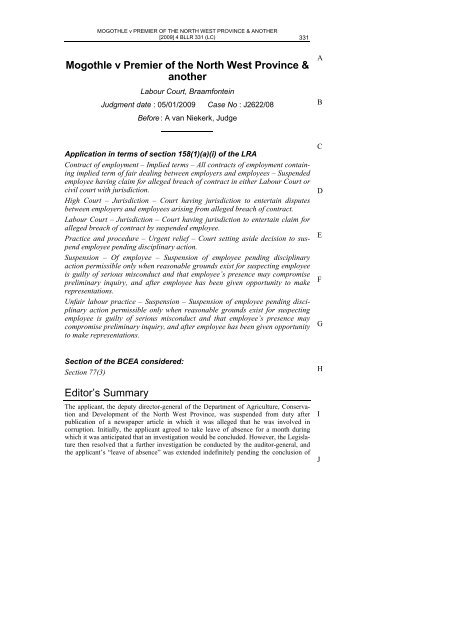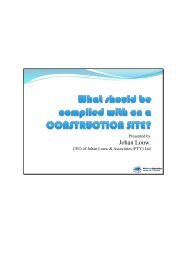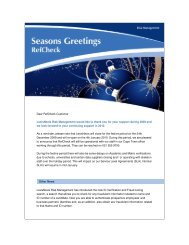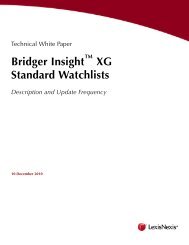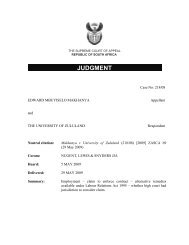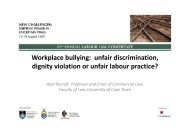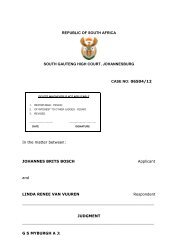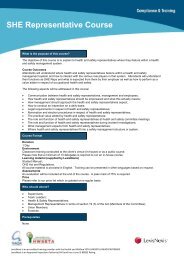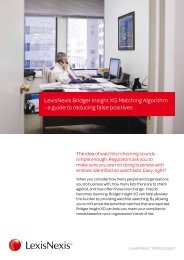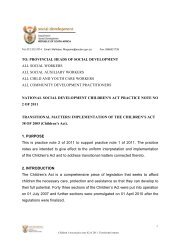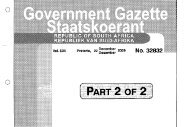Mogothle v Premier of the Northwest Province and others
Mogothle v Premier of the Northwest Province and others
Mogothle v Premier of the Northwest Province and others
Create successful ePaper yourself
Turn your PDF publications into a flip-book with our unique Google optimized e-Paper software.
MOGOTHLE v PREMIER OF THE NORTH WEST PROVINCE & ANOTHER[2009] 4 BLLR 331 (LC) 331<strong>Mogothle</strong> v <strong>Premier</strong> <strong>of</strong> <strong>the</strong> North West <strong>Province</strong> &ano<strong>the</strong>rLabour Court, BraamfonteinJudgment date : 05/01/2009 Case No : J2622/08Before : A van Niekerk, JudgeABApplication in terms <strong>of</strong> section 158(1)(a)(i) <strong>of</strong> <strong>the</strong> LRAContract <strong>of</strong> employment – Implied terms – All contracts <strong>of</strong> employment containingimplied term <strong>of</strong> fair dealing between employers <strong>and</strong> employees – Suspendedemployee having claim for alleged breach <strong>of</strong> contract in ei<strong>the</strong>r Labour Court orcivil court with jurisdiction.High Court – Jurisdiction – Court having jurisdiction to entertain disputesbetween employers <strong>and</strong> employees arising from alleged breach <strong>of</strong> contract.Labour Court – Jurisdiction – Court having jurisdiction to entertain claim foralleged breach <strong>of</strong> contract by suspended employee.Practice <strong>and</strong> procedure – Urgent relief – Court setting aside decision to suspendemployee pending disciplinary action.Suspension – Of employee – Suspension <strong>of</strong> employee pending disciplinaryaction permissible only when reasonable grounds exist for suspecting employeeis guilty <strong>of</strong> serious misconduct <strong>and</strong> that employee’s presence may compromisepreliminary inquiry, <strong>and</strong> after employee has been given opportunity to makerepresentations.Unfair labour practice – Suspension – Suspension <strong>of</strong> employee pending disciplinaryaction permissible only when reasonable grounds exist for suspectingemployee is guilty <strong>of</strong> serious misconduct <strong>and</strong> that employee’s presence maycompromise preliminary inquiry, <strong>and</strong> after employee has been given opportunityto make representations.CDEFGSection <strong>of</strong> <strong>the</strong> BCEA considered:Section 77(3)Editor’s SummaryThe applicant, <strong>the</strong> deputy director-general <strong>of</strong> <strong>the</strong> Department <strong>of</strong> Agriculture, Conservation<strong>and</strong> Development <strong>of</strong> <strong>the</strong> North West <strong>Province</strong>, was suspended from duty afterpublication <strong>of</strong> a newspaper article in which it was alleged that he was involved incorruption. Initially, <strong>the</strong> applicant agreed to take leave <strong>of</strong> absence for a month duringwhich it was anticipated that an investigation would be concluded. However, <strong>the</strong> Legislature<strong>the</strong>n resolved that a fur<strong>the</strong>r investigation be conducted by <strong>the</strong> auditor-general, <strong>and</strong><strong>the</strong> applicant’s “leave <strong>of</strong> absence” was extended indefinitely pending <strong>the</strong> conclusion <strong>of</strong>HIJ
MOGOTHLE v PREMIER OF THE NORTH WEST PROVINCE & ANOTHER332 [2009] 4 BLLR 331 (LC)Athat investigation. The applicant <strong>the</strong>n launched an urgent application, contending that hehad been unlawfully suspended because he had not been afforded a hearing before hisBCDEFGHIJ
MOGOTHLE v PREMIER OF THE NORTH WEST PROVINCE & ANOTHER[2009] 4 BLLR 331 (LC) 333suspension was extended. His action was based on an alleged breach <strong>of</strong> contract, allegedfailure by <strong>the</strong> respondents to comply with <strong>the</strong> provisions <strong>of</strong> <strong>the</strong> disciplinary code formanagers in <strong>the</strong> public service, <strong>and</strong> an alleged violation <strong>of</strong> his rights under <strong>the</strong> Promotion<strong>of</strong> Administrative Justice Act 3 <strong>of</strong> 2000 (“PAJA”). The respondent argued that <strong>the</strong> matterwas not urgent, that <strong>the</strong> Court lacked jurisdiction to entertain <strong>the</strong> matter <strong>and</strong> that, in anyevent, <strong>the</strong> applicant’s enforced “leave <strong>of</strong> absence” was lawful.The Court observed that <strong>the</strong> judgment in Chirwa v Transnet Ltd & o<strong>the</strong>rs [2008] 2BLLR 97 (CC) cast considerable doubt on whe<strong>the</strong>r <strong>the</strong> applicant could claim relief under<strong>the</strong> PAJA. However, <strong>the</strong> Court declined to rule on that point, since it sufficed to consideronly whe<strong>the</strong>r <strong>the</strong> Labour Court had jurisdiction to entertain <strong>the</strong> applicant’s claim undercontract. The Court noted in this regard that in three recent judgments, <strong>the</strong> SupremeCourt <strong>of</strong> Appeal has emphasised <strong>the</strong> mutual relationship <strong>of</strong> trust <strong>and</strong> confidence imposedby <strong>the</strong> common law contract <strong>of</strong> employment (see Old Mutual Life Assurance Co SA Ltd vGumbi [2007] 8 BLLR 699 (SCA); Boxer Superstores Mthatha & ano<strong>the</strong>r v Mbenya[2007] 8 BLLR 693 (SCA); <strong>and</strong> Murray v Minister <strong>of</strong> Defence [2008] 6 BLLR 513(SCA)). Although <strong>the</strong> development <strong>of</strong> <strong>the</strong> element <strong>of</strong> fairness in <strong>the</strong> common law contract<strong>of</strong> employment was controversial, <strong>the</strong> SCA had unequivocally established a contractualright to fair dealing which binds all employers <strong>and</strong> confers on all employees a rightto enforce that right, which exists independently <strong>of</strong> statutory protection against unfairdismissal <strong>and</strong> unfair labour practice. The Court held that, in <strong>the</strong> absence <strong>of</strong> any higherauthority to <strong>the</strong> contrary, it was obliged to follow <strong>the</strong> SCA judgments.The Court noted fur<strong>the</strong>r that <strong>the</strong> respondent had argued that on a “broad reading”, <strong>the</strong>Chirwa judgment had impliedly overruled <strong>the</strong> SCA judgments. On that point, <strong>the</strong> Courtnoted that <strong>the</strong> Chirwa judgment could be read on two levels. Narrowly construed, <strong>the</strong>judgment dealt only with whe<strong>the</strong>r <strong>the</strong> High Court had jurisdiction to entertain claims bydismissed public servants. At a more general level, <strong>the</strong> Chirwa judgment suggests that allemployment-related disputes involving allegations <strong>of</strong> unfair conduct by employersshould be decided in <strong>the</strong> dispute resolution forums established under <strong>the</strong> Labour RelationsAct 66 <strong>of</strong> 1995 (“<strong>the</strong> LRA”). The latter reading would mean that, in <strong>the</strong> light <strong>of</strong>Chirwa, any remedy established by <strong>the</strong> LRA must be pursued to <strong>the</strong> exclusion <strong>of</strong> anyright that may previously have existed. However, although <strong>the</strong> Chirwa judgment constitutesan obvious endorsement <strong>of</strong> <strong>the</strong> mechanisms, institutions <strong>and</strong> remedies created by<strong>the</strong> LRA, <strong>the</strong> judgment did not expressly exclude <strong>the</strong> right <strong>of</strong> employees to pursuecontractual claims ei<strong>the</strong>r in <strong>the</strong> Labour Court by virtue <strong>of</strong> <strong>the</strong> provisions <strong>of</strong> <strong>the</strong> BasicConditions <strong>of</strong> Employment Act 75 <strong>of</strong> 1997 (“<strong>the</strong> BCEA”) or in a civil court with <strong>the</strong>requisite jurisdiction. If <strong>the</strong> Constitutional Court wished to override three judgments <strong>of</strong><strong>the</strong> SCA, it would have done so in express terms.The Court held fur<strong>the</strong>r that <strong>the</strong> concurrent jurisdiction <strong>of</strong> <strong>the</strong> Labour Court <strong>and</strong> <strong>the</strong>civil courts in matters concerning contracts <strong>of</strong> employment did not conflict with <strong>the</strong>policy considerations expressed in Chirwa. The BCEA, enacted two years after <strong>the</strong> LRA,was also <strong>the</strong> product <strong>of</strong> negotiation between <strong>the</strong> social partners. By enacting section77(3) <strong>of</strong> <strong>the</strong> BCEA, <strong>the</strong> drafters acknowledged that disputes concerning contracts <strong>of</strong>employment had not been eclipsed by <strong>the</strong> LRA. Any problems that might be created by<strong>the</strong> concurrent jurisdiction <strong>of</strong> <strong>the</strong> Labour Court <strong>and</strong> civil courts in disputes concerningcontracts <strong>of</strong> employment would be for <strong>the</strong> Legislature to resolve.Turning to <strong>the</strong> merits, <strong>the</strong> Court noted that <strong>the</strong> suspension <strong>of</strong> an employee pending aninquiry into alleged misconduct is equivalent to an arrest, <strong>and</strong> should <strong>the</strong>refore be usedonly when <strong>the</strong>re is a reasonable apprehension that <strong>the</strong> employee will interfere withinvestigations or pose some o<strong>the</strong>r threat. The Court noted that <strong>the</strong>re have been twoapproaches to “preventive” suspension – one holding that a hearing before suspensionwas not necessary, <strong>the</strong> o<strong>the</strong>r holding that it is. The second approach is consistent with fairdealing in <strong>the</strong> employment context. This requires that an employee should not be suspendedunless <strong>the</strong>re are prima facie grounds for believing that <strong>the</strong> employee has committedserious misconduct <strong>and</strong> <strong>the</strong>re is some objectively justifiable reason for excluding <strong>the</strong>ABCDEFGHIJ
MOGOTHLE v PREMIER OF THE NORTH WEST PROVINCE & ANOTHER334 [2009] 4 BLLR 331 (LC)ABCDemployee from <strong>the</strong> workplace, <strong>and</strong> unless <strong>the</strong> employee has been given an opportunity tomake representations, albeit not <strong>of</strong> <strong>the</strong> kind required by <strong>the</strong> “criminal justice” model <strong>of</strong>workplace disciplinary action.The Court held fur<strong>the</strong>r that <strong>the</strong> evidence suggested that <strong>the</strong> MEC responsible for taking<strong>the</strong> decision to suspend <strong>the</strong> applicant had merely followed <strong>the</strong> behest <strong>of</strong> <strong>the</strong> Legislature.This was unfair because, as <strong>the</strong> executing <strong>of</strong>ficer, <strong>the</strong> MEC should himself have tried tobalance <strong>the</strong> wishes <strong>of</strong> <strong>the</strong> Legislature with <strong>the</strong> applicant’s interests. Fur<strong>the</strong>rmore, <strong>the</strong>rewas no indication on <strong>the</strong> papers that <strong>the</strong> applicant’s presence in <strong>the</strong> workplace wouldjeopardise <strong>the</strong> investigations. It was common cause that <strong>the</strong> applicant had not beenafforded a hearing <strong>of</strong> any kind before his suspension. The applicant’s suspension wasaccordingly unfair <strong>and</strong>, as such, breached <strong>the</strong> applicant’s contractual right to be treatedfairly. The Court accordingly had jurisdiction to entertain <strong>the</strong> application.As to <strong>the</strong> requirements <strong>of</strong> urgency, <strong>the</strong> Court noted that suspension may have seriouspersonal <strong>and</strong> social consequences for <strong>the</strong> employee, <strong>and</strong> that <strong>the</strong> right to work is linked to<strong>the</strong> right to dignity. The matter was <strong>the</strong>refore urgent even though it had no pecuniaryconsequences for <strong>the</strong> applicant. The Court held fur<strong>the</strong>r that, although <strong>the</strong> applicant mighthave a claim for damages, this was not an adequate alternative remedy in <strong>the</strong> circumstances.The decision requiring <strong>the</strong> applicant to take fur<strong>the</strong>r leave <strong>of</strong> absence was set aside.JudgmentEFGHIVan Niekerk J:Introduction <strong>and</strong> background[1] The applicant, <strong>the</strong> deputy director-general <strong>of</strong> <strong>the</strong> Department <strong>of</strong> Agriculture,Conservation <strong>and</strong> Development in <strong>the</strong> North West <strong>Province</strong>, bringsthis application, as a matter <strong>of</strong> urgency, to set aside his suspension.[2] The applicant disavows reliance on <strong>the</strong> Labour Relations Act 66 <strong>of</strong> 1995(“<strong>the</strong> Act/LRA”). He founds this application on three grounds – breach <strong>of</strong>contract, breach <strong>of</strong> statute, <strong>and</strong> <strong>the</strong> Promotion <strong>of</strong> Administrative JusticeAct 3 <strong>of</strong> 2000 (“PAJA”). The applicant contends that his suspension isunlawful for one or more <strong>of</strong> <strong>the</strong> following reasons:• The decision to suspend him was taken by <strong>the</strong> respondents underdirection from <strong>the</strong> North West Legislature <strong>and</strong> not in <strong>the</strong> exercise <strong>of</strong>a discretion entrusted to <strong>the</strong>m.• Certain jurisdictional preconditions for <strong>the</strong> suspension were notsatisfied (<strong>the</strong>se relate to an alleged breach <strong>of</strong> a regulatory measuregoverning <strong>the</strong> suspension <strong>of</strong> senior public sector employees). And,• He was not heard before <strong>the</strong> decision to suspend him was taken.[3] The respondents oppose <strong>the</strong> application on three grounds:• The application is not urgent.• This court has no jurisdiction to grant <strong>the</strong> order that <strong>the</strong> applicantseeks unless he follows <strong>the</strong> procedures contemplated by <strong>the</strong> LRA.And,J
MOGOTHLE v PREMIER OF THE NORTH WEST PROVINCE & ANOTHERVAN NIEKERK J [2009] 4 BLLR 331 (LC) 335• In any event, <strong>the</strong> applicant’s suspension (or “leave <strong>of</strong> absence” as itis described by <strong>the</strong> respondents) is valid <strong>and</strong> lawful.[4] In so far as <strong>the</strong> “breach <strong>of</strong> statute” component <strong>of</strong> <strong>the</strong> applicant’s claim isconcerned, that claim is founded primarily on what is referred to as <strong>the</strong>“SMS code”, a code <strong>of</strong> conduct governing senior management servicewithin <strong>the</strong> public service. It is not clear to me from <strong>the</strong> papers whe<strong>the</strong>r <strong>the</strong>SMS code is a statutory or o<strong>the</strong>r regulatory measure, or a collectiveagreement, or both. I am accordingly unable, in this respect, to discernany clear right that might stem from <strong>the</strong> code as statute.[5] In so far as <strong>the</strong> applicant’s claim is based on PAJA, <strong>the</strong> judgment <strong>of</strong> <strong>the</strong>Constitutional Court in Chirwa v Transnet Ltd & o<strong>the</strong>rs 2008 (3) BCLR251 (CC) [also reported at [2008] 2 BLLR 97 (CC) – Ed] casts significantdoubt on whe<strong>the</strong>r public sector employees have <strong>the</strong> right to claim that <strong>the</strong>exercise <strong>of</strong> a contractual power by <strong>the</strong>ir employers, where that conduct isconcerned with labour <strong>and</strong> employment relations, constitutes administrativeaction for <strong>the</strong> purposes <strong>of</strong> PAJA. The majority judgments <strong>of</strong> SkweyiyaJ at paragraph [73] <strong>and</strong> Ngcobo J at paragraph [150] both hold that aremedy under section 33 <strong>of</strong> <strong>the</strong> Constitution <strong>of</strong> <strong>the</strong> Republic <strong>of</strong> South Africa,1996 is not available to public sector employees who complain <strong>of</strong>unfair conduct by <strong>the</strong>ir employers. Both judgments expressly leave open<strong>the</strong> question whe<strong>the</strong>r PAJA affords a remedy in <strong>the</strong>se circumstances. Inhis minority judgment (at paragraph [194]), Langa CJ expressly states thathis conclusion that Chirwa’s dismissal was not administrative action underPAJA should not be construed to mean that dismissals <strong>of</strong> public sectoremployees would never constitute administrative action under PAJA. Afuller discussion on <strong>the</strong> interpretation <strong>of</strong> <strong>the</strong> Chirwa judgment follows below,but for present purposes <strong>and</strong> for reasons that will become apparent, Ido not regard it necessary to determine whe<strong>the</strong>r <strong>the</strong> applicant has a remedyunder PAJA, 1 <strong>and</strong> consider only that part <strong>of</strong> <strong>the</strong> applicant’s claim thatis founded in contract.[6] The facts giving rise to this dispute are largely common cause. Theirsubstance is set out below.[7] The applicant was employed by <strong>the</strong> department with effect from 1 April2006. He answers to <strong>the</strong> first respondent (“<strong>the</strong> <strong>Premier</strong>”) <strong>and</strong> also to <strong>the</strong> secondrespondent (“<strong>the</strong> MEC”), to <strong>the</strong> extent that <strong>the</strong> <strong>Premier</strong> has delegated herpowers to him. The applicant’s contract incorporates a number <strong>of</strong> statutory<strong>and</strong> o<strong>the</strong>r regulatory provisions, including, it would seem, <strong>the</strong> SMS code. Thepart <strong>of</strong> <strong>the</strong> code relevant to <strong>the</strong>se proceedings reads as follows:“Precautionary suspension or transfer(a) The employer may suspend or transfer a member on full pay if–• The member is alleged to have committed a serious <strong>of</strong>fence. And,• The employer believes that <strong>the</strong> presence <strong>of</strong> a member at <strong>the</strong>workplace might jeopardise any investigation into <strong>the</strong> alleged misconduct,or endanger <strong>the</strong> well being or safety <strong>of</strong> any person or stateproperty.ABCDEFGHI________________________1 The tenor <strong>of</strong> <strong>the</strong> majority judgments is that <strong>the</strong>re is no such right.J
MOGOTHLE v PREMIER OF THE NORTH WEST PROVINCE & ANOTHER336 [2009] 4 BLLR 331 (LC) VAN NIEKERK JABCDEFGHIJ(b) A suspension or transfer <strong>of</strong> this kind is a precautionary measure thatdoes not constitute a judgment, <strong>and</strong> must be on full pay.(c) If a member is suspended or transferred as a precautionary measure, <strong>the</strong>employer must hold a disciplinary hearing within 60 days. The chair <strong>of</strong><strong>the</strong> hearing must <strong>the</strong>n decide on any fur<strong>the</strong>r postponement.”[8] On 4 November 2008, an article appeared in <strong>the</strong> Mail <strong>and</strong> Guardian inwhich imputations <strong>of</strong> corruption were levelled against <strong>the</strong> applicant. Thearticle stated that <strong>the</strong> applicant, a member <strong>of</strong> Thathana Farms CC, was <strong>the</strong>beneficiary <strong>of</strong> a State grant <strong>and</strong> had signed <strong>the</strong> operative contract in bothhis <strong>of</strong>ficial capacity, as a representative <strong>of</strong> <strong>the</strong> donor, <strong>and</strong> in his capacityas a representative <strong>of</strong> Thathana, <strong>the</strong> recipient <strong>of</strong> <strong>the</strong> grant.[9] The applicant claims that <strong>the</strong> grant was made in <strong>the</strong> regular <strong>and</strong> ordinarycourse <strong>of</strong> a State subsidy scheme, <strong>and</strong> that he had nothing to do with <strong>the</strong>decision to allocate <strong>the</strong> grant. He states that he was particularly concernedat <strong>the</strong> implications <strong>of</strong> a conflict <strong>of</strong> interest in <strong>the</strong> context <strong>of</strong> <strong>the</strong> implementation<strong>of</strong> <strong>the</strong> decision to allocate a grant to Thathana <strong>and</strong>, for this reason,over <strong>and</strong> above <strong>the</strong> procedures relevant to <strong>the</strong> application for a grant, on30 January 2008, he formally made full disclosure to <strong>the</strong> MEC <strong>of</strong> hisstatus <strong>and</strong> that <strong>of</strong> his family members as members <strong>of</strong> <strong>the</strong> close corporationseeking <strong>the</strong> grant. In his memor<strong>and</strong>um to <strong>the</strong> MEC, <strong>the</strong> applicant states:“I belief (sic) it is ethically <strong>and</strong> morally correct to obtain approval with regardto this corporation to avoid a conflict <strong>of</strong> interest <strong>and</strong> possible claims <strong>of</strong>abuse <strong>of</strong> my position.”The MEC countersigned <strong>the</strong> memor<strong>and</strong>um on <strong>the</strong> same day <strong>the</strong>reby bothacknowledging <strong>the</strong> applicant’s disclosure <strong>and</strong> approving <strong>the</strong> grant. In<strong>the</strong>se circumstances, <strong>the</strong> applicant avers that his signature <strong>of</strong> <strong>the</strong> relevantfunding agreement was a formal culmination <strong>of</strong> a process whose substantiveoutcome had already elsewhere been determined. The respondents donot dispute <strong>the</strong>se full <strong>and</strong> c<strong>and</strong>id averments, <strong>and</strong> I accept <strong>the</strong>refore that <strong>the</strong>applicant made full disclosure to <strong>the</strong> MEC <strong>of</strong> his interest in <strong>the</strong> grant thatis <strong>the</strong> subject <strong>of</strong> <strong>the</strong> proposed investigation that forms <strong>the</strong> raison d’être <strong>of</strong><strong>the</strong> applicant’s suspension.[10] On 10 November 2008, <strong>the</strong> MEC appointed Sekela Auditors to investigate<strong>the</strong> allegations made in <strong>the</strong> article. At this point, <strong>the</strong> MEC selfevidentlyconsidered that <strong>the</strong>re was no risk that <strong>the</strong> applicant might compromise<strong>the</strong> investigation, because he took no steps to suspend him.[11] On 11 November 2008, <strong>the</strong> newspaper article was referred to <strong>the</strong> Legislaturefor debate, which took place on 13 November. The <strong>of</strong>ficial minute <strong>of</strong><strong>the</strong> debate is recorded in <strong>the</strong> following terms:“Deputy speaker summed up <strong>the</strong> recommendations that emanated from <strong>the</strong>debate as follows:– That <strong>the</strong> Legislature must initiate an investigation into <strong>the</strong> allegationsunder discussion through its structures like <strong>the</strong> Provincial Public AccountsCommittee.– That <strong>the</strong> provincial Treasury must intervene <strong>and</strong> take over <strong>the</strong> administration<strong>of</strong> this department while <strong>the</strong> investigation unfold or considerinvoking section 100 <strong>of</strong> <strong>the</strong> Constitution, Act 108 <strong>of</strong> 1996. And,– That <strong>the</strong> accounting <strong>of</strong>ficer <strong>and</strong> <strong>the</strong> MEC must be put on suspensionpending <strong>the</strong> outcome <strong>of</strong> <strong>the</strong> investigation.”
MOGOTHLE v PREMIER OF THE NORTH WEST PROVINCE & ANOTHERVAN NIEKERK J [2009] 4 BLLR 331 (LC) 337[12] On 17 November 2008, <strong>the</strong> MEC wrote a letter to <strong>the</strong> applicant in whichhe referred to <strong>the</strong> debate in <strong>the</strong> Legislature. He also confirmed <strong>the</strong> appointment<strong>of</strong> Sekela Auditors to provide an audit report without delay.The letter makes specific reference to <strong>the</strong> SMS regarding a possible precautionarysuspension, <strong>and</strong> records that <strong>the</strong> MEC did not intend to invokethose provisions. He states <strong>the</strong> following:“In an effort to give <strong>the</strong> investigation process space <strong>and</strong> latitude to proceedwithout being hindered <strong>and</strong> also to allow <strong>the</strong> process to unfold without anyinferences <strong>of</strong> being jeopardised by your continued presence at work, it is mysincere request that you take leave <strong>of</strong> absence from your <strong>of</strong>ficial duties wi<strong>the</strong>ffect from 18 November 2008 until such time as <strong>the</strong> investigation process iscompleted.”The applicant did not challenge this “leave <strong>of</strong> absence” on <strong>the</strong> basis tha<strong>the</strong> had been assured by <strong>the</strong> MEC that <strong>the</strong> investigation would be completedby month end, <strong>and</strong> that it had been agreed that he would return towork on 1 December 2008.[13] The Mail <strong>and</strong> Guardian article came up for discussion in <strong>the</strong> Legislaturefor a second time on 18 November 2008. This time <strong>the</strong> Legislatureadopted <strong>the</strong> following resolution:“(i) That <strong>the</strong> Provincial Legislature takes a responsibility <strong>and</strong> initiates aforensic investigation led by <strong>the</strong> auditor-general <strong>of</strong>fice into <strong>the</strong> allegations<strong>and</strong> that <strong>the</strong> investigation initiated by MEC Serfontein should nolonger proceed, which must be conducted by <strong>the</strong> <strong>of</strong>fice <strong>of</strong> <strong>the</strong> auditorgeneral.(ii) That <strong>the</strong> House must recommend to <strong>the</strong> <strong>Premier</strong> to put <strong>the</strong> HOD <strong>of</strong> <strong>the</strong>Department <strong>of</strong> Agriculture, Conservation & Environment on extendedleave pending <strong>the</strong> outcome <strong>of</strong> <strong>the</strong> investigation.(iii) That if <strong>the</strong> investigation findings implicate <strong>the</strong> MEC in <strong>the</strong> allegedirregularities, which will in contravention with section 136 <strong>of</strong> <strong>the</strong> ConstitutionAct 108 <strong>of</strong> 1996. The <strong>Premier</strong> must do what is required <strong>of</strong> herin terms <strong>of</strong> <strong>the</strong> provisions <strong>of</strong> <strong>the</strong> Constitution <strong>of</strong> RSA (sic).”[14] On 19 November 2008, <strong>the</strong> deputy speaker <strong>of</strong> <strong>the</strong> Legislature wrote aletter to <strong>the</strong> MEC. In <strong>the</strong> letter, <strong>the</strong> deputy speaker stated <strong>the</strong> following:“Consistent with <strong>the</strong> constitutional responsibility <strong>of</strong> exercising oversight on<strong>the</strong> Executive by <strong>the</strong> NWPL, <strong>the</strong> injunction which equally bestows <strong>the</strong> Legislaturewith powers to make decision which are peremptory <strong>and</strong> as such bindingon <strong>the</strong> Executive, in <strong>the</strong> foregoing instance likewise, we have thus taken<strong>the</strong> following decision.”The letter proceeded to record <strong>the</strong> terms <strong>of</strong> <strong>the</strong> resolution adopted <strong>the</strong>previous day, <strong>and</strong> concluded by recording <strong>the</strong> deputy speaker’s trust that“<strong>the</strong> contents herein are self-explanatory”.[15] After receiving notice <strong>of</strong> <strong>the</strong> resolution, <strong>the</strong> MEC terminated Sekela’sm<strong>and</strong>ate <strong>and</strong> waited for <strong>the</strong> auditor-general’s <strong>of</strong>fice to commence its investigation.On 1 December 2008, <strong>the</strong> applicant reported for duty. TheMEC told him that because Sekela’s m<strong>and</strong>ate had been terminated, <strong>and</strong>because <strong>the</strong> auditor-general’s <strong>of</strong>fice had not yet commenced its investigation,he would require time to consider <strong>the</strong> matter <strong>and</strong> discuss it with <strong>the</strong>Acting <strong>Premier</strong>. The MEC discussed <strong>the</strong> matter with <strong>the</strong> Acting <strong>Premier</strong>ABCDEFGHIJ
MOGOTHLE v PREMIER OF THE NORTH WEST PROVINCE & ANOTHER338 [2009] 4 BLLR 331 (LC) VAN NIEKERK JABCDEFGHIJ<strong>and</strong> <strong>the</strong>n resolved that <strong>the</strong> applicant’s leave be extended to 14 December2008 so that <strong>the</strong> auditor-general’s investigation might commence.[16] On 3 December 2008, <strong>the</strong> MEC addressed a letter to <strong>the</strong> applicant confirmingthat <strong>the</strong> applicant was placed on extended leave <strong>of</strong> absence until14 December 2008. The rationale pr<strong>of</strong>fered for <strong>the</strong> leave <strong>of</strong> absence was<strong>the</strong> anticipated investigation by <strong>the</strong> auditor-general. The MEC sought todistance himself from <strong>the</strong> Legislature’s resolution <strong>and</strong> what purported tobe no less than a directive from <strong>the</strong> deputy speaker:“Take notice that my decision to place you on leave has no or little relationwith <strong>the</strong> resolutions or <strong>the</strong> decisions <strong>of</strong> <strong>the</strong> North West Provincial Legislatureon 18 November 2008 as I do not agree with running <strong>the</strong> Department withouta substantive HOD. I have considered this matter purely on <strong>the</strong> basis that Ineed to give <strong>the</strong> investigation, if any, a chance to take place without any perceivedjeopardy on your part.”[17] The MEC states that it <strong>the</strong>n became clear to him that 14 December was anunrealistic target date for <strong>the</strong> commencement <strong>and</strong> conclusion <strong>of</strong> <strong>the</strong> investigation.He <strong>the</strong>refore decided again to place <strong>the</strong> applicant on what heterms “extended leave” stating that he did not know precisely when <strong>the</strong>auditor-general would complete <strong>the</strong> investigation.[18] On 5 December 2008, <strong>the</strong> MEC wrote a letter to <strong>the</strong> applicant placing himon extended leave <strong>of</strong> absence pending <strong>the</strong> outcome <strong>of</strong> <strong>the</strong> auditorgeneral’sinvestigation. The operative paragraph <strong>of</strong> <strong>the</strong> letter reads:“After considering <strong>the</strong> resolutions taken at <strong>the</strong> Provincial Legislature sitting, Ihave decided, in consultation with <strong>the</strong> Acting <strong>Premier</strong>, to put you on extendedleave <strong>of</strong> absence to allow <strong>the</strong> investigations to be taken by <strong>the</strong> auditorgeneralto take place unhindered.”[19] It is common cause that <strong>the</strong> applicant was not afforded a hearing beforebeing placed on extended leave <strong>of</strong> absence. In <strong>the</strong>ir answering affidavit,<strong>the</strong> respondents deny that <strong>the</strong> SMS code makes provision for a hearingbefore a suspension is invoked <strong>and</strong> aver that, in any event, <strong>the</strong> applicanthad every opportunity to raise whatever issue he wished when he was advisedthat he would be required to take extended leave.[20] On 11 December 2008, <strong>the</strong> applicant filed this application.Fairness <strong>and</strong> <strong>the</strong> common law contract <strong>of</strong> employment[21] In a trio <strong>of</strong> recent decisions by <strong>the</strong> Supreme Court <strong>of</strong> Appeal, that courthas emphasised <strong>the</strong> mutual relationship <strong>of</strong> trust <strong>and</strong> confidence that <strong>the</strong>common law contract <strong>of</strong> employment imposes on both employers <strong>and</strong>employees. In Old Mutual Life Assurance Co SA Ltd v Gumbi [2007] 8BLLR 699 (SCA), <strong>the</strong> SCA ruled that <strong>the</strong> common law contract <strong>of</strong> employmentshould be developed in <strong>the</strong> light <strong>of</strong> <strong>the</strong> Constitution, specificallyto include a contractual right to a pre-dismissal hearing. The court reasonedas follows:“It is clear, however, that coordinate rights are now protected by <strong>the</strong> commonlaw: to <strong>the</strong> extent necessary, as developed under <strong>the</strong> constitutional imperative(section 39(2)) to harmonise <strong>the</strong> common law into <strong>the</strong> Bill <strong>of</strong> Rights (whichitself includes <strong>the</strong> right to fair labour practices (section 23(1)).” (At paragraph5 <strong>of</strong> <strong>the</strong> judgment.)
MOGOTHLE v PREMIER OF THE NORTH WEST PROVINCE & ANOTHERVAN NIEKERK J [2009] 4 BLLR 331 (LC) 339[22] The Gumbi judgment was confirmed in Boxer Superstores Mthatha &ano<strong>the</strong>r v Mbenya [2007] 8 BLLR 693 (SCA). In that case, <strong>the</strong> court held:“This court has recently held that <strong>the</strong> common law contract <strong>of</strong> employmenthas been developed in accordance with <strong>the</strong> Constitution to include a right to apre-dismissal hearing (Old Mutual Life Assurance Co SA Ltd v Gumbi). Thismeans that every employee now has a common law contractual claim – notmerely a statutory unfair labour practice right – to a pre-dismissal hearing.”(At paragraph 6 <strong>of</strong> <strong>the</strong> judgment.)[23] More recently, in Murray v Minister <strong>of</strong> Defence [2008] 6 BLLR 513(SCA), <strong>the</strong> SCA derived a contractual right not to be constructively dismissedfrom what it held to be a duty on all employers <strong>of</strong> fair dealing atall times with <strong>the</strong>ir employees (at 517C). This obligation, a continuing obligation<strong>of</strong> fairness that rests on an employer when it makes decisions thataffect an employee at work, was held by <strong>the</strong> court to have both a procedural<strong>and</strong> a substantive dimension.[24] The development <strong>of</strong> <strong>the</strong> common law by <strong>the</strong> SCA is not uncontroversial. Ithas been criticised, amongst o<strong>the</strong>r grounds, for opening <strong>the</strong> door to a dualjurisprudence in which common law principles are permitted to competewith <strong>the</strong> protection conferred by <strong>the</strong> unfair dismissal <strong>and</strong> unfair labour practiceprovisions <strong>of</strong> <strong>the</strong> LRA (see, for example, Halton Cheadle “Labour Law<strong>and</strong> <strong>the</strong> Constitution”, a paper given to <strong>the</strong> annual SASLAW Conference inOctober 2007 <strong>and</strong> published in Current Labour Law 2008, <strong>the</strong> commentsby PAK le Roux at 3 <strong>of</strong> <strong>the</strong> same publication, <strong>and</strong> <strong>the</strong> article by Paul PretoriusSC <strong>and</strong> Anton Myburgh “A Dual System <strong>of</strong> Dismissal law: Commenton Boxer Superstores Mthatha & ano<strong>the</strong>r v Mbenya (2007) 28 ILJ 2209(SCA)” published in (2007) 28 ILJ 2172). 2 Be that as it may, <strong>the</strong> SCA hasunequivocally established a contractual right to fair dealing that binds allemployers, a right that may be enforced by all employees both in relation tosubstance <strong>and</strong> procedure, <strong>and</strong> which exists independently <strong>of</strong> any statutoryprotection against unfair dismissal <strong>and</strong> unfair labour practices. 3 This Courtis bound by <strong>the</strong> authorities to which I have referred <strong>and</strong> is obliged, in <strong>the</strong>absence <strong>of</strong> any higher authority, to enforce <strong>the</strong> contractual right <strong>of</strong> fair dealingas between employer <strong>and</strong> employee.Does <strong>the</strong> Chirwa judgment deny <strong>the</strong> applicant a claim in contract?[25] This brings me to <strong>the</strong> respondents’ argument that in <strong>the</strong> absence <strong>of</strong> anyreliance by him <strong>of</strong> <strong>the</strong> provisions <strong>of</strong> <strong>the</strong> LRA, this Court has no jurisdictionto entertain <strong>the</strong> applicant’s claim. Mr Pretorius SC, who with Mr________________________2 The authors <strong>of</strong> <strong>the</strong> latter article acknowledge that <strong>the</strong> South African Constitution contemplates<strong>the</strong> development <strong>of</strong> <strong>the</strong> common law, but <strong>the</strong>y note that <strong>the</strong> English courts, for what appear tobe policy-related reasons, have adopted a ra<strong>the</strong>r different course. The authors quote Lord Milletin Johnson v Unisys Ltd [2001] 2 All ER 801 (HL) who said:“But <strong>the</strong> creation <strong>of</strong> a statutory right [against unfair dismissal] has made any such development<strong>of</strong> <strong>the</strong> common law both unnecessary <strong>and</strong> undesirable . . . <strong>the</strong> co-existence <strong>of</strong> two systems,overlapping but varying in matters <strong>of</strong> detail <strong>and</strong> heard by different tribunals, would bea recipe for chaos. All coherence in our employment laws would be lost.” (At paragraph80.)3 There is an obvious overlap here – <strong>the</strong> jurisprudence developed under <strong>the</strong> statutory regime willobviously <strong>the</strong> nature <strong>and</strong> extent <strong>of</strong> <strong>the</strong> contractual right <strong>of</strong> fair dealing.ABCDEFGHIJ
MOGOTHLE v PREMIER OF THE NORTH WEST PROVINCE & ANOTHER340 [2009] 4 BLLR 331 (LC) VAN NIEKERK JABCDEFGHMakola appeared for <strong>the</strong> respondents, submitted that a broad reading <strong>of</strong><strong>the</strong> judgment in Chirwa v Transnet Ltd, supra, had <strong>the</strong> effect <strong>of</strong> overruling<strong>the</strong> trio <strong>of</strong> judgments by <strong>the</strong> SCA to which I have referred above. If<strong>the</strong> applicant had any claim, it was one contemplated by <strong>the</strong> LRA <strong>and</strong> noo<strong>the</strong>r.[26] The narrow question that <strong>the</strong> Constitutional Court considered in Chirwawas, <strong>of</strong> course, whe<strong>the</strong>r Parliament had conferred jurisdiction to determineMs Chirwa’s claim (an alleged unfair dismissal <strong>of</strong> a public sectoremployee) 4 on this Court <strong>and</strong> o<strong>the</strong>r dispute-resolution institutions establishedby <strong>the</strong> LRA <strong>and</strong> whe<strong>the</strong>r, expressly or by necessary implication,<strong>the</strong> jurisdiction <strong>of</strong> <strong>the</strong> High Court had been ousted. At a higher, perhapsmore policy-orientated level, <strong>the</strong> Chirwa judgment might be read to requirethat all employment-related disputes involving allegations <strong>of</strong> unfairconduct by both public <strong>and</strong> private sector employers ought to be dealtwith in terms <strong>of</strong> <strong>the</strong> dispute resolution institutions <strong>and</strong> mechanisms establishedby <strong>the</strong> LRA. This reading <strong>of</strong> <strong>the</strong> Chirwa judgment requires that in alabour-related dispute, any remedy established by <strong>the</strong> LRA must be pursuedto <strong>the</strong> exclusion <strong>of</strong> any o<strong>the</strong>r that might previously have beenthought to exist. Put ano<strong>the</strong>r way, it suggests that <strong>the</strong> objective <strong>of</strong> <strong>the</strong>LRA was to be exhaustive <strong>of</strong> all rights arising from employment.[27] The interpretation <strong>of</strong> <strong>the</strong> Chirwa judgment has spawned a complex <strong>and</strong>controversial debate – this much is evident from <strong>the</strong> judgments <strong>of</strong> <strong>the</strong> FullBench <strong>of</strong> <strong>the</strong> Ciskeian High Court in Nonzamo Cleaning Services Cooperativev Appie & o<strong>the</strong>rs [2008] 9 BLLR 901 (Ck); Nakin v MEC, Department<strong>of</strong> Education, Eastern Cape <strong>Province</strong> & ano<strong>the</strong>r [2008] 5 BLLR489 (Ck); <strong>and</strong> <strong>the</strong> judgment by <strong>the</strong> SCA in Makambi v MEC, Department<strong>of</strong> Education, Eastern Cape [2008] 8 BLLR 711 (SCA). 5[28] Although <strong>the</strong> judgment <strong>of</strong> <strong>the</strong> Constitutional Court in Chirwa is an obvious<strong>and</strong> clear endorsement <strong>of</strong> <strong>the</strong> virtues <strong>of</strong> <strong>the</strong> mechanisms, institutions<strong>and</strong> remedies crafted by <strong>the</strong> LRA <strong>and</strong> <strong>the</strong> merits <strong>of</strong> what Skweyiya J (referringto <strong>the</strong> explanatory memor<strong>and</strong>um accompanying <strong>the</strong> LRA) termeda “one-stop shop” for all labour-related disputes established by that statute,I do not underst<strong>and</strong> <strong>the</strong> judgment expressly to exclude <strong>the</strong> right <strong>of</strong> anemployee to pursue a contractual claim, ei<strong>the</strong>r in this Court (by virtue <strong>of</strong><strong>the</strong> provisions <strong>of</strong> section 77(3) <strong>of</strong> <strong>the</strong> Basic Conditions <strong>of</strong> EmploymentAct 75 <strong>of</strong> 1997 (“<strong>the</strong> BCEA”), or in a civil court with jurisdiction. Nowherein <strong>the</strong> judgment is it unequivocally stated that <strong>the</strong> effect <strong>of</strong> <strong>the</strong> legislativereforms effected after 1994 <strong>and</strong>, in particular, <strong>the</strong> creation <strong>of</strong>specific statutory remedies to address unfairness in employment practices,is to deprive an employee <strong>of</strong> any common law contractual rights, or <strong>of</strong> <strong>the</strong>right to enforce <strong>the</strong>m in a civil court, or in this Court, in terms <strong>of</strong> section________________________IJ4 Chirwa claimed an administrative law remedy in <strong>the</strong> High Court in circumstances where unfairlabour practice proceedings initially instituted by her in terms <strong>of</strong> <strong>the</strong> LRA in <strong>the</strong> CCMA hadbeen ab<strong>and</strong>oned.5 See, in particular, <strong>the</strong> judgment by Nugent JA who states that he is unable to discern any clearlegal as opposed to policy basis for <strong>the</strong> majority judgments. (At paragraph [21].) Nugent JAadopts a narrow view <strong>of</strong> <strong>the</strong> Chirwa decision, suggesting, “apart from its jurisdictional ruling,Chirwa indicates <strong>the</strong> dismissal <strong>of</strong> a public service employee does not constitute administrativeaction”. (At paragraph [21].)
MOGOTHLE v PREMIER OF THE NORTH WEST PROVINCE & ANOTHERVAN NIEKERK J [2009] 4 BLLR 331 (LC) 34177(3) <strong>of</strong> <strong>the</strong> BCEA. 6 If <strong>the</strong> Constitutional Court in Chirwa had intended tomake a ruling to this effect, overriding as it would have done a consistentline <strong>of</strong> judgments by <strong>the</strong> SCA, it would have done so in express terms.[29] My conclusion that Chirwa does not have <strong>the</strong> effect <strong>of</strong> confining anemployee only to <strong>the</strong> remedies provided by <strong>the</strong> LRA (thus precluding anemployee from seeking to enforce any contractual remedy) does not fly in<strong>the</strong> face <strong>of</strong> <strong>the</strong> policy reasons that underpin <strong>the</strong> concern, expressed in <strong>the</strong>judgments <strong>of</strong> <strong>the</strong> majority <strong>of</strong> <strong>the</strong> Constitutional Court in Chirwa, to protect<strong>the</strong> integrity <strong>of</strong> <strong>the</strong> system <strong>of</strong> conciliation, arbitration <strong>and</strong> adjudicationwithin specialist structures, a system agreed to by <strong>the</strong> social partners, aftera careful balancing <strong>of</strong> competing interests. The BCEA, enacted some twoyears after <strong>the</strong> LRA, is just as much <strong>the</strong> product <strong>of</strong> negotiation by <strong>the</strong> socialpartners, <strong>and</strong> <strong>the</strong> Act represents as much <strong>of</strong> a finely balanced compromiseas <strong>the</strong> LRA. When <strong>the</strong> social partners agreed to <strong>the</strong> terms <strong>of</strong>section 77(3) <strong>of</strong> <strong>the</strong> BCEA, <strong>the</strong>y acknowledged that disputes concerningcontracts <strong>of</strong> employment had not been eclipsed by <strong>the</strong> LRA, <strong>and</strong> that thisCourt ought appropriately to be conferred with powers to determine contractualdisputes, concurrently with <strong>the</strong> civil courts.[30] In summary: The approach adopted by <strong>the</strong> majority <strong>of</strong> <strong>the</strong> SCA in FedlifeAssurance Ltd v Wolfaardt 2002 (1) SA 49 (SCA) [also reported at [2001]12 BLLR 1301 (SCA) – Ed] remains intact post-Chirwa – <strong>the</strong> LRA doesnot expressly or impliedly abrogate an employee’s common law entitlementto enforce contractual rights. As controversial as <strong>the</strong> judgments inGumbi, Boxer Superstores <strong>and</strong> Murray, supra, might be as a matter <strong>of</strong> lawor policy, <strong>the</strong>y unequivocally acknowledge a common law contractual obligationon an employer to act fairly in its dealings with employees. Thisobligation has both a substantive <strong>and</strong> a procedural dimension. In determining<strong>the</strong> nature <strong>and</strong> extent <strong>of</strong> <strong>the</strong> mutual obligation <strong>of</strong> fair dealing asbetween employer <strong>and</strong> employee, <strong>the</strong> court must be guided by <strong>the</strong> unfairdismissal <strong>and</strong> unfair labour practice jurisprudence developed over <strong>the</strong>years. If any “dual stream” jurisprudence emerges as a consequence <strong>and</strong> ifthis represents an undesirable outcome from a policy perspective, that is amatter for <strong>the</strong> Legislature to resolve. Finally, if an employer acts inbreach <strong>of</strong> its contractual obligation <strong>of</strong> fair dealing, <strong>the</strong> affected employeemay seek to enforce a contractual remedy which may, by virtue <strong>of</strong> section77(3) <strong>of</strong> <strong>the</strong> BCEA, be sought in this Court.Did <strong>the</strong> respondents act in breach <strong>of</strong> <strong>the</strong> obligation <strong>of</strong> fair dealingin suspending <strong>the</strong> applicant?[31] In so far as <strong>the</strong> substantive dimension <strong>of</strong> fair dealing in relation to suspensionis concerned, Halton Cheadle has observed that suspension is <strong>the</strong>ABCDEFGH________________________6 On <strong>the</strong> contrary, that position, articulated n <strong>the</strong> minority judgment <strong>of</strong> Froneman AJA in Fedlife<strong>and</strong> reflected in Johnson v Unisys Ltd, supra, has consistently been rejected by <strong>the</strong> SCA. InBoxer Superstores, Cameron JA endorsed <strong>the</strong> following passage in Fedlife:“Where . . . <strong>the</strong> subject <strong>of</strong> a dispute is <strong>the</strong> lawfulness <strong>of</strong> a dismissal, <strong>the</strong>n <strong>the</strong> fact that itmight also be, <strong>and</strong> probably is unfair, is quite coincidental for that is not what <strong>the</strong> employee’scomplaint is about.” (At paragraph 12.)IJ
MOGOTHLE v PREMIER OF THE NORTH WEST PROVINCE & ANOTHER342 [2009] 4 BLLR 331 (LC) VAN NIEKERK JABCDEFGHIJemployment equivalent <strong>of</strong> arrest, with <strong>the</strong> consequence that an employeesuffers palpable prejudice to reputation, advancement <strong>and</strong> fulfilment. Onthis basis, he suggests that employees should be suspended pending a disciplinaryenquiry only in exceptional circumstances. The only reasonablerationale for suspension in <strong>the</strong>se circumstances, Cheadle suggests, is <strong>the</strong>reasonable apprehension that <strong>the</strong> employee will interfere with any investigationthat has been initiated, or repeat <strong>the</strong> misconduct in question (seeCheadle “Regulated Flexibility <strong>and</strong> Small Business: Revisiting <strong>the</strong> LRA<strong>and</strong> <strong>the</strong> BCEA” (DPRU Working Paper number 06/109 DPRU, University<strong>of</strong> Cape Town, June 2006, also published in edited form in (2006) 27ILJ 663 at paragraph [71])).[32] The procedural dimension <strong>of</strong> <strong>the</strong> obligation <strong>of</strong> fair dealing in suspensionhas been <strong>the</strong> subject <strong>of</strong> two broad approaches. The first is that adopted bythis Court in Koka v Director-General: Provincial Administration NorthWest Government (1997) 18 ILJ 1018 (LC) [also reported at [1997] 7BLLR 874 (LC) – Ed]. In that case, L<strong>and</strong>man J considered <strong>the</strong> statutorydefinition <strong>of</strong> unfair labour practice <strong>and</strong>, in particular, <strong>the</strong> reference to suspensionor any o<strong>the</strong>r form <strong>of</strong> disciplinary action short <strong>of</strong> dismissal in respect<strong>of</strong> an employee. The case concerned <strong>the</strong> suspension <strong>of</strong> a publicsector employee on terms that accorded <strong>the</strong> employee half his emolumentsfor <strong>the</strong> period <strong>of</strong> suspension. Although <strong>the</strong> court dealt with <strong>the</strong> matteras one concerning a suspension without pay, none <strong>of</strong> <strong>the</strong> principlesrecognised <strong>and</strong> applied in <strong>the</strong> judgment turn on this fact. The court distinguishedtwo kinds <strong>of</strong> suspension – <strong>the</strong> first being a “holding operation”,where <strong>the</strong> purpose <strong>of</strong> suspension is not to impose discipline but for reasons<strong>of</strong> good administration; <strong>the</strong> second being suspension as a form <strong>of</strong>discipline as a penalty, one less stringent than dismissal. The court concludedthat <strong>the</strong> definition <strong>of</strong> “unfair labour practice” was sufficientlybroad to cover both forms <strong>of</strong> suspension, <strong>and</strong> dismissed an application forinterim relief, setting aside <strong>the</strong> suspension, on <strong>the</strong> basis that <strong>the</strong> applicant’sproper remedy was to refer <strong>the</strong> dispute to <strong>the</strong> appropriate bargainingcouncil for conciliation. In doing so, <strong>the</strong> court was obviouslypersuaded by <strong>the</strong> remarks made by Denning MR in Lewis v Heffer & o<strong>the</strong>rs[1978] 3 All ER 354 (CA):“Very <strong>of</strong>ten irregularities are disclosed in a government department or in abusiness house; <strong>and</strong> a man may be suspended on full pay pending enquiries.Suspicion may rest on him; <strong>and</strong> he is suspended until he is cleared <strong>of</strong> it. Noone, as far as I know, has ever questioned such a suspension on <strong>the</strong> groundthat it could not be done unless he is given notice <strong>of</strong> <strong>the</strong> charge <strong>and</strong> an opportunity<strong>of</strong> defending himself, <strong>and</strong> so forth. The suspension in such a case ismerely done by way <strong>of</strong> good administration. A situation has arisen in whichsomething must be done at once. The work <strong>of</strong> <strong>the</strong> department or <strong>of</strong>fice is beingaffected by rumours <strong>and</strong> suspicions. The o<strong>the</strong>rs will not trust <strong>the</strong> man. Inorder to get back to proper work, <strong>the</strong> man is suspended. At that stage <strong>the</strong>rules <strong>of</strong> natural justice do not apply . . .” (At 364c–e.)[33] I would make three observations regarding <strong>the</strong> facts in Koka <strong>and</strong> L<strong>and</strong>manJ’s conclusion. The first is that <strong>the</strong> claim was one brought squarelyunder <strong>the</strong> unfair labour practice provision <strong>of</strong> <strong>the</strong> LRA, but in circumstanceswhere <strong>the</strong> remedies available to <strong>the</strong> applicant in <strong>the</strong> ordinary
MOGOTHLE v PREMIER OF THE NORTH WEST PROVINCE & ANOTHERVAN NIEKERK J [2009] 4 BLLR 331 (LC) 343course under that statute had not been invoked. That distinguishes <strong>the</strong>case from <strong>the</strong> present, where <strong>the</strong> applicant disavows any reliance on <strong>the</strong>LRA. Secondly, on <strong>the</strong> facts <strong>of</strong> Koka, <strong>the</strong> applicant had been invited to aformal hearing to appear to give reasons why he should not be suspendedin circumstances where <strong>the</strong> reasons for <strong>the</strong> proposed suspension had beendisclosed to him. The notice <strong>of</strong> suspension was issued only after <strong>the</strong> hearing,at which <strong>the</strong> applicant had been given <strong>the</strong> fullest opportunity to contestboth <strong>the</strong> allegations made against him <strong>and</strong> <strong>the</strong> reasons pr<strong>of</strong>fered byhis employer for <strong>the</strong> proposed suspension, <strong>and</strong> to provide substantial informationabout his personal circumstances <strong>and</strong> <strong>the</strong> impact that any suspensionmight have on those circumstances. Thirdly, <strong>the</strong> Koka judgment,supra, to <strong>the</strong> extent that it holds that <strong>the</strong>re is no right to be heard prior to asuspension in <strong>the</strong> form <strong>of</strong> a “holding operation” (at 1029G–H, where <strong>the</strong>court refers to Dickson v Commonwealth 1992 55 CLR 34 at 44) 7 is atodds with <strong>the</strong> decision <strong>of</strong> <strong>the</strong> Cape Provincial Division <strong>of</strong> <strong>the</strong> High Courtin Muller v Chairman, Ministers’ Council, House <strong>of</strong> Representatives(1991) 12 ILJ 761 (C).[34] The second (<strong>and</strong> preferred) approach to procedural fairness is reflected inMuller, supra, where <strong>the</strong> court granted an urgent application in which <strong>the</strong>applicants, <strong>of</strong>ficers in <strong>the</strong> public service, sought an urgent review <strong>of</strong> <strong>the</strong>irsuspension pending disciplinary action. Although <strong>the</strong> remedy sought wasadministrative in nature, <strong>the</strong> judgment delivered by <strong>the</strong> court (Howie J, ashe <strong>the</strong>n was, with Nel J concurring) is a masterful review <strong>of</strong> domestic <strong>and</strong>comparative authorities on <strong>the</strong> application <strong>of</strong> <strong>the</strong> audi alteram partemprinciple in <strong>the</strong> context <strong>of</strong> <strong>the</strong> suspension <strong>of</strong> public sector employees. Thecourt rejected <strong>the</strong> approach represented by <strong>the</strong> Lewis judgment, <strong>and</strong>adopted instead <strong>the</strong> approach <strong>of</strong> Dixon v Commonwealth (1981) 55 FLR34; Schmohl v Commonwealth 1983 ACTR 24; <strong>and</strong> Birss v Secretary <strong>of</strong>Justice (1984) 1 NZLR 513, refusing to follow Jacobs & <strong>and</strong>ere v Ministervan Justisie & <strong>and</strong>ere (unreported case) <strong>and</strong> Swart & o<strong>the</strong>rs v Minister<strong>of</strong> Education & Culture, House <strong>of</strong> Representatives & ano<strong>the</strong>r 1986 (3) SA331 (C), both <strong>of</strong> which had previously held that <strong>the</strong> audi rule did not applyin <strong>the</strong> case <strong>of</strong> suspensions effected in terms <strong>of</strong> <strong>the</strong> relevant legislation.In Muller, <strong>the</strong> court concluded that <strong>the</strong> interests <strong>of</strong> fairness dem<strong>and</strong>ed ahearing before suspension, <strong>and</strong> noted <strong>the</strong> “startling unfairness” withwhich <strong>the</strong> denial <strong>of</strong> that right could operate (at 524F). 8[35] Although, as Mr Pretorius submitted, <strong>the</strong> Muller case was concerned with<strong>the</strong> application <strong>of</strong> <strong>the</strong> audi rule to a suspension in a statutory context <strong>and</strong>in circumstances where <strong>the</strong> employees concerned had been suspendedABCDEFGH________________________7 The case is incorrectly cited. The citation reflected in <strong>the</strong> Muller judgment is Dixon v Commonwealth(1981) 55 FLR 34 (see <strong>the</strong> Muller judgment at 773E). More fundamentally, though,<strong>the</strong> Dixon judgment does not support <strong>the</strong> proposition that suspension, as a holding operationdoes not require <strong>the</strong> employee to be heard. On <strong>the</strong> contrary, <strong>the</strong> court in that case held that atwo-fold decision to suspend <strong>and</strong> to withhold remuneration was invalid, because <strong>of</strong> <strong>the</strong> employer’sfailure to comply with <strong>the</strong> audi alteram partem principle.8 Muller has been followed in a number <strong>of</strong> cases – see, for example, Mhlauli v Minister <strong>of</strong>Department <strong>of</strong> Home Affairs & o<strong>the</strong>rs NNO (1992) 13 ILJ 1146 (SE) [also reported at [1992] 2All SA 177 (SE) – Ed].IJ
MOGOTHLE v PREMIER OF THE NORTH WEST PROVINCE & ANOTHER344 [2009] 4 BLLR 331 (LC) VAN NIEKERK JABCDEFGHIwithout pay, <strong>the</strong> court’s observations <strong>of</strong> <strong>the</strong> unfairness necessarily visitedon a suspended employee remain relevant, in my view, to a determination<strong>of</strong> what might constitute fair dealing in a contractual context.[36] The right to be heard prior to suspension has been <strong>the</strong> subject <strong>of</strong> tworecent decisions by this Court. In HOSPERSA & ano<strong>the</strong>r v MEC forHealth, Gauteng Provincial Government [2008] 9 BLLR 861 (LC), BassonJ granted relief, on an urgent basis, to an employee who had beentransferred for reasons relating to alleged misconduct. The judgmentdraws an analogy in this context with <strong>the</strong> suspension <strong>of</strong> an employeepending a disciplinary enquiry, <strong>and</strong> expressly holds that an employee isentitled to a hearing before <strong>the</strong> employer acts against <strong>the</strong> employee. InSAPO Ltd v Jansen van Vuuren NO & o<strong>the</strong>rs [2008] 8 BLLR 798 (LC),Molahlehi J stated:“There is, however, a need to send a message to employers that <strong>the</strong>y shouldrefrain from hastily resorting to suspending employees when <strong>the</strong>re are novalid reasons to do so. Suspensions have a detrimental impact on <strong>the</strong> affectedemployee <strong>and</strong> may prejudice his or her reputation, advancement, job security<strong>and</strong> fulfilment. It is <strong>the</strong>refore necessary that suspensions are based on substantivereasons <strong>and</strong> fair procedures are followed prior to suspending an employee.In o<strong>the</strong>r words, unless circumstances dictate o<strong>the</strong>rwise, <strong>the</strong> employershould <strong>of</strong>fer an employee an opportunity to be heard before placing him orher on suspension.” (At paragraph 37.)[37] I do not think that what <strong>the</strong> court intended by this statement was that ahearing prior to a suspension should be modelled on what has beentermed <strong>the</strong> “criminal justice model” with all <strong>of</strong> <strong>the</strong> hallmarks <strong>of</strong> a criminaltrial. This court has held previously that <strong>the</strong> Code <strong>of</strong> Good Practice: Dismissalin Schedule 8 to <strong>the</strong> LRA envisages a less formal; process, one inwhich <strong>the</strong> employer <strong>and</strong> employee engage in what <strong>the</strong> ILO’s Committee<strong>of</strong> Experts has termed, in <strong>the</strong> context <strong>of</strong> pre-dismissal procedures, a process<strong>of</strong> dialogue <strong>and</strong> reflection between <strong>the</strong> parties. 9 I see no reason why<strong>the</strong> same conception <strong>of</strong> procedural fairness should not apply prior to aproposed suspension pending an investigation into alleged misconduct.[38] This statement by Molahlehi J is also a response, I believe, to <strong>the</strong> trendapparent in this Court in which employers tend to regard suspension as alegitimate measure <strong>of</strong> first resort to <strong>the</strong> most groundless suspicion <strong>of</strong> misconduct,or worse still, to view suspension as a convenient mechanism tomarginalise an employee who has fallen from favour.[39] In summary: Each case <strong>of</strong> preventative suspension must be considered onits own merits. At a minimum though, <strong>the</strong> application <strong>of</strong> <strong>the</strong> contractualprinciple <strong>of</strong> fair dealing between employer <strong>and</strong> employee, imposing as itdoes a continuing <strong>of</strong> fairness on employers when <strong>the</strong>y make decisions affecting<strong>the</strong>ir employees, requires first that <strong>the</strong> employer has a justifiablereason to believe, prima facie at least, that <strong>the</strong> employee has engaged inserious misconduct; secondly, that <strong>the</strong>re is some objectively justifiablereason to deny <strong>the</strong> employee access to <strong>the</strong> workplace based on <strong>the</strong> integrity<strong>of</strong> any pending investigation into <strong>the</strong> alleged misconduct or some________________________J9 See Avril Elizabeth Home for <strong>the</strong> Mentally H<strong>and</strong>icapped v CCMA & o<strong>the</strong>rs (2006) 27 ILJ 1644(LC) [also reported at [2006] 9 BLLR 833 (LC) – Ed] at 1653.
MOGOTHLE v PREMIER OF THE NORTH WEST PROVINCE & ANOTHERVAN NIEKERK J [2009] 4 BLLR 331 (LC) 345o<strong>the</strong>r relevant factor that would place <strong>the</strong> investigation or <strong>the</strong> interests <strong>of</strong>affected parties in jeopardy; <strong>and</strong>, thirdly, that <strong>the</strong> employee is given <strong>the</strong>opportunity to state a case before <strong>the</strong> employer makes any final decisionto suspend <strong>the</strong> employee.Application <strong>of</strong> principles to <strong>the</strong> facts[40] It is common cause that on 17 November 2008, <strong>the</strong> MEC wrote to <strong>the</strong>applicant stating that while he did not wish to invoke <strong>the</strong> provisions <strong>of</strong> <strong>the</strong>SMS code, he “sincerely requested” that <strong>the</strong> applicant take leave from 18November 2008 until <strong>the</strong> Sekela Auditors investigation was completed.This would permit “<strong>the</strong> necessary processes to be undertaken without anyperceived jeopardy <strong>and</strong>/or influence on your part”. In <strong>the</strong> MEC’s letterdated 19 November 2008, this time responding to resolutions <strong>of</strong> <strong>the</strong> Legislature,<strong>the</strong> applicant was placed on extended leave <strong>of</strong> absence until 14December 2008, “mainly to allow <strong>the</strong> anticipated investigation by <strong>the</strong>auditor-general to take place during that period”. The MEC added: “Ihave considered this matter purely on <strong>the</strong> basis that I need to give <strong>the</strong> investigation,if any, a chance to take place without any perceived jeopardyon your part”. What jeopardy <strong>the</strong> applicant might suffer is not made clear– what is clear though is that not once, in any <strong>of</strong> his correspondence with<strong>the</strong> applicant, did <strong>the</strong> MEC refer to <strong>the</strong> jeopardy in which <strong>the</strong> departmentor o<strong>the</strong>r third parties might be placed should <strong>the</strong> applicant be permitted toremain at work, or <strong>the</strong> danger that he might pose to <strong>the</strong> safety or wellbeing<strong>of</strong> any person.[41] The principle <strong>of</strong> fair dealing fur<strong>the</strong>r required that <strong>the</strong> MEC exercise anindependent discretion in relation to any decision to suspend <strong>the</strong> applicant.The papers filed in this application bear out <strong>the</strong> applicant’s contentionthat <strong>the</strong> Legislature considered itself entitled to give <strong>the</strong> departmentinstructions to suspend <strong>the</strong> applicant, <strong>and</strong> that in suspending him, <strong>the</strong>MEC heeded those instructions. In his founding affidavit, <strong>the</strong> applicantmakes <strong>the</strong> express allegation that <strong>the</strong> MEC would not have acted as hehad if <strong>the</strong> Legislature had not passed <strong>the</strong> resolution it did. Although <strong>the</strong>allegation is denied only in general terms, <strong>the</strong> undisputed facts bear outthis conclusion. By <strong>the</strong> time <strong>the</strong> applicant was finally suspended, <strong>the</strong>MEC had changed his position no less than five times: first he appointedSekela Auditors but left <strong>the</strong> applicant unsuspended; <strong>the</strong>n, by agreement,he suspended <strong>the</strong> applicant until <strong>the</strong> end <strong>of</strong> November; <strong>the</strong>n he withdrewSekela’s m<strong>and</strong>ate; <strong>the</strong>n he unilaterally suspended <strong>the</strong> applicant until <strong>the</strong>middle <strong>of</strong> December; <strong>and</strong>, finally, he suspended <strong>the</strong> applicant indefinitely.These shifts in position precisely match <strong>the</strong> resolutions adopted by <strong>the</strong>Legislature, <strong>and</strong> what <strong>the</strong> deputy speaker regarded as instructions that heconsidered <strong>the</strong> Legislature entitled to issue. The MEC’s conduct smacks<strong>of</strong> a subservient <strong>and</strong> inappropriate response to <strong>the</strong> Legislature. Fairnessrequired <strong>the</strong> MEC to exercise an independent discretion, one that wouldhave acknowledged <strong>the</strong> Legislature’s position but that would have accountedtoo for o<strong>the</strong>r competing interests, not least those <strong>of</strong> <strong>the</strong> applicant.[42] In short, nowhere in <strong>the</strong> correspondence between <strong>the</strong> parties is <strong>the</strong>re anyallegation that <strong>the</strong> applicant’s continued presence might jeopardise any <strong>of</strong>ABCDEFGHIJ
MOGOTHLE v PREMIER OF THE NORTH WEST PROVINCE & ANOTHER346 [2009] 4 BLLR 331 (LC) VAN NIEKERK JABCDEFGHIJ<strong>the</strong> investigations that were proposed, nor is <strong>the</strong>re any suggestion that <strong>the</strong>well-being or safety <strong>of</strong> any person or property would be endangered. Therespondents have failed in <strong>the</strong>ir affidavits to produce any substantive evidenceto satisfy ei<strong>the</strong>r <strong>of</strong> <strong>the</strong>se requirements.[43] In regard to procedural fairness, I noted above that it is common causethat <strong>the</strong>y applicant was not afforded a hearing. Although <strong>the</strong> SMS code issilent on <strong>the</strong> requirement <strong>of</strong> a hearing, for <strong>the</strong> reasons recorded above, <strong>the</strong>audi alteram partem principle required that prior to his indefinite suspension,<strong>the</strong> applicant be given an opportunity to state a case in response toany proposal to that effect made by <strong>the</strong> respondents. To <strong>the</strong> extent that <strong>the</strong>respondents make <strong>the</strong> argument that <strong>the</strong> applicant had an opportunity torequest a hearing at which submissions could be made but chose not to doso, this submission overlooks <strong>the</strong> point that it is not for <strong>the</strong> employee torequest a hearing, but for <strong>the</strong> employer to <strong>of</strong>fer one.[44] To summarise: There is no clear reason articulated by <strong>the</strong> respondents asto why <strong>the</strong> applicant’s suspension was necessary in order to protect <strong>the</strong> integrity<strong>of</strong> <strong>the</strong> proposed enquiry, nor have <strong>the</strong> respondents established anybasis on which it might be suggested that <strong>the</strong> applicant’s continued presenceat work would endanger <strong>the</strong> safety or well-being <strong>of</strong> any person. Fur<strong>the</strong>r,<strong>the</strong> respondents failed to afford <strong>the</strong> applicant any substantial right toa fair hearing prior to his suspension.[45] For <strong>the</strong>se reasons, I am satisfied that <strong>the</strong> applicant has established a clearright to <strong>the</strong> relief that he seeks.O<strong>the</strong>r requirements relevant to final relief[46] In relation to urgency, <strong>the</strong> applicant avers that his employment gives him<strong>the</strong> right to work in order to satisfy <strong>the</strong> incorporeal <strong>and</strong> emotional needthat <strong>the</strong> right to work confers, <strong>and</strong> that his prospects <strong>of</strong> earning pre-setperformance targets are compromised unless he works <strong>the</strong> full year. Therespondents submit that <strong>the</strong> applicant’s suspension will not prejudice hisrights to any bonus to which he may become entitled, <strong>and</strong> that in anyevent, in terms <strong>of</strong> <strong>the</strong> SMS code, any suspension is limited to 60 days, atwhich point a disciplinary hearing must be convened.[47] In regard to <strong>the</strong> prejudice suffered by <strong>the</strong> applicant, Muller’s case, supra,although it dealt with <strong>the</strong> additional dimension <strong>of</strong> a deprivation <strong>of</strong> remunerationduring a period <strong>of</strong> suspension, emphasises <strong>the</strong> personal <strong>and</strong> socialconsequences that suspension brings. The link between <strong>the</strong> freedomto engage in productive work <strong>and</strong> <strong>the</strong> right to dignity was recently emphasisedby Nugent JA in Minister <strong>of</strong> Home Affairs & o<strong>the</strong>rs v Watchenuka& ano<strong>the</strong>r 2004 (4) SA 326 (SCA) [also reported at [2004] 1 All SA 21(SCA) – Ed], where he stated:“The freedom to engage in productive work – even where that is not requiredin order to survive – is indeed an important component <strong>of</strong> human dignity. . . for mankind is pre-eminently a social species with an instinct formeaningful association. Self-esteem <strong>and</strong> <strong>the</strong> sense <strong>of</strong> self-worth – <strong>the</strong> fulfilment<strong>of</strong> what it is to be human – is most <strong>of</strong>ten bound up with being acceptedas socially useful.” (At paragraph [27].)
MOGOTHLE v PREMIER OF THE NORTH WEST PROVINCE & ANOTHERVAN NIEKERK J [2009] 4 BLLR 331 (LC) 347In so far as <strong>the</strong> 60-day limitation is concerned, as I already noted, <strong>the</strong>respondents have cast <strong>the</strong> applicant’s suspension as a period <strong>of</strong> “indefiniteleave”, suggesting that it is intended to be indefinite. Taken cumulatively,<strong>the</strong> non-pecuniary consequences for <strong>the</strong> applicant <strong>of</strong> his suspension <strong>and</strong>its indefinite nature satisfy <strong>the</strong> requirements <strong>of</strong> urgency in this instance.[48] Finally, I am also satisfied that <strong>the</strong> applicant has no o<strong>the</strong>r alternativeremedy. The respondents submit that <strong>the</strong> applicant may seek adequate redressin terms <strong>of</strong> <strong>the</strong> unfair labour practice provisions <strong>of</strong> <strong>the</strong> LRA. Thatmay be so, but <strong>the</strong> applicant has elected (as he is entitled to do for <strong>the</strong> reasonsreflected above) to pursue a contractual remedy. The fact that <strong>the</strong>applicant may have some o<strong>the</strong>r cause <strong>of</strong> action that he elects not to invokeis <strong>of</strong> no consequence. The respondents’ claim, in <strong>the</strong>se circumstances, thatan action for damages will cure any loss that <strong>the</strong> applicant has suffered,takes no account <strong>of</strong> <strong>the</strong> fact that a claim for damages is costly, time consuming<strong>and</strong> complex <strong>and</strong> that, in any event, it cannot account for <strong>the</strong> detrimentalconsequences <strong>of</strong> indefinite suspension, especially those <strong>of</strong> amore incorporeal nature referred to by Nugent JA in <strong>the</strong> Watchenukajudgment, supra.[49] The applicant is entitled to <strong>the</strong> relief that he seeks. I accordingly make <strong>the</strong>following order:1. The decision <strong>of</strong> <strong>the</strong> second respondent requiring <strong>the</strong> applicant to takeleave <strong>of</strong> absence is set aside.2. The respondents, jointly <strong>and</strong> severally, are to pay <strong>the</strong> costs <strong>of</strong> <strong>the</strong>seproceedingsFor <strong>the</strong> applicant:Adv MSM Brassey SC instructed by SM Mookeletsi AttorneysFor <strong>the</strong> respondents:Adv PJ Pretorius SC <strong>and</strong> Adv BL Makola instructed by Kgomo, Mokhetle &Tlou AttorneysABCDEFGThe following cases were referred to in <strong>the</strong> above judgment:South AfricaAvril Elizabeth Home for <strong>the</strong> Mentally H<strong>and</strong>icapped v CCMA & o<strong>the</strong>rs[2006] 9 BLLR 833 ((2006) 27 ILJ 1644) (LC) ......................................... 343Boxer Superstores Mthatha & ano<strong>the</strong>r v Mbenya[2007] 8 BLLR 693 (SCA) ......................................................................... 338Chirwa v Transnet Ltd & o<strong>the</strong>rs [2008] 2 BLLR 97;2008 (3) BCLR 251 (CC) ........................................................................... 334Fedlife Assurance Ltd v Wolfaardt [2001] 12 BLLR 1301(2002 (1) SA 49) (SCA) ............................................................................. 340HOSPERSA & ano<strong>the</strong>r v MEC for Health, Gauteng ProvincialGovernment [2008] 9 BLLR 861 (LC) ....................................................... 343Jacobs & <strong>and</strong>ere v Minister van Justisie & <strong>and</strong>ere (unreported case) ............ 342HIJ
MOGOTHLE v PREMIER OF THE NORTH WEST PROVINCE & ANOTHER348 [2009] 4 BLLR 331 (LC) VAN NIEKERK JABCDEKoka v Director-General: Provincial Administration North WestGovernment [1997] 7 BLLR 874 ((1997) 18 ILJ 1018) (LC) .................... 341Makambi v MEC, Department <strong>of</strong> Education, Eastern Cape[2008] 8 BLLR 711 (SCA)......................................................................... 339Mhlauli v Minister <strong>of</strong> Department <strong>of</strong> Home Affairs & o<strong>the</strong>rs NNO[1992] 2 All SA 177 ((1992) 13 ILJ 1146) (SE)......................................... 342Minister <strong>of</strong> Home Affairs & o<strong>the</strong>rs v Watchenuka & ano<strong>the</strong>r[2004] 1 All SA 21 (2004 (4) SA 326) (SCA)............................................ 345Muller & o<strong>the</strong>rs v Chairman, Ministers’ Council: House <strong>of</strong> Representatives& o<strong>the</strong>rs (1991) 12 ILJ 761 (C) .................................................................. 342Murray v Minister <strong>of</strong> Defence [2008] 6 BLLR 513 (SCA)............................ 338Nakin v MEC, Department <strong>of</strong> Education, Eastern Cape <strong>Province</strong> &ano<strong>the</strong>r [2008] 5 BLLR 489 (Ck) ............................................................... 339Nonzamo Cleaning Services Cooperative v Appie & o<strong>the</strong>rs[2008] 9 BLLR 901 (Ck)............................................................................ 339Old Mutual Life Assurance Co SA Ltd v Gumbi[2007] 8 BLLR 699 (SCA)......................................................................... 337SAPO Ltd v Jansen van Vuuren NO & o<strong>the</strong>rs [2008] 8 BLLR 798 (LC) ...... 343Swart & o<strong>the</strong>rs v Minister <strong>of</strong> Education & Culture, House <strong>of</strong>Representatives & ano<strong>the</strong>r 1986 (3) SA 331 (C)........................................ 342AustraliaSchmohl v Commonwealth 1983 ACTR 24 ................................................... 342New Zeal<strong>and</strong>Birss v Secretary <strong>of</strong> Justice (1984) 1 NZLR 513 ............................................ 342United KingdomDixon v Commonwealth (1981) 55 FLR 34 ................................................... 342Johnson v Unisys Ltd [2001] 2 All ER 801 (HL)........................................... 338Lewis v Heffer & o<strong>the</strong>rs [1978] 3 All ER 354 (CA) ...................................... 341


